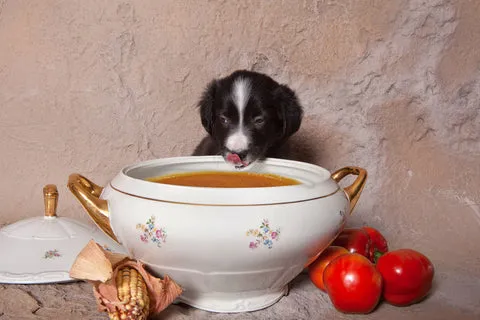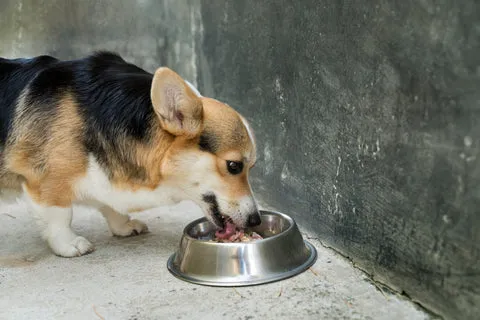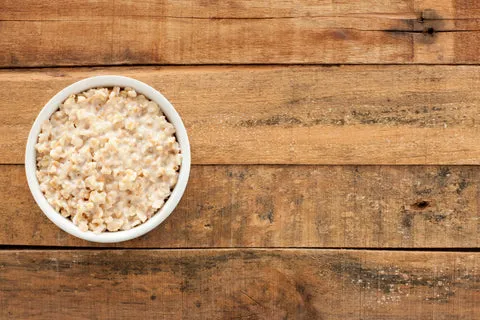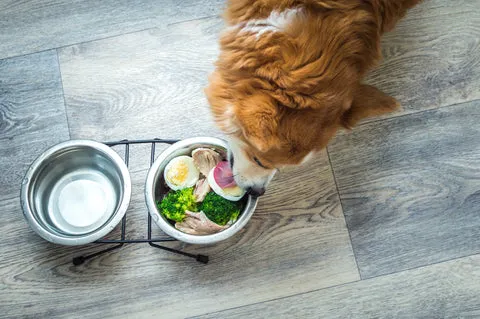When your beloved canine companion is usually full of energy and enthusiastically greets their food bowl, it can be incredibly concerning when they suddenly lose their appetite or show signs of an upset stomach. Just like humans, dogs can feel under the weather, and a common first sign is often a change in their eating habits. Knowing What Can Dogs Eat When They Are Sick is crucial for every pet parent, as providing the right nutrition is vital to support their energy levels, soothe their digestive system, and ultimately, speed up their recovery.
An upset stomach, vomiting, or diarrhea can leave your dog feeling weak and uncomfortable. While a trip to the vet is always recommended for persistent or severe symptoms, offering a bland, easily digestible diet can often provide much-needed relief and sustenance during mild illness. This guide from Dog Care Story will walk you through safe and nutritious food options for dogs experiencing illness, focusing on gentle choices that won’t exacerbate their symptoms. We’ll also cover considerations for dogs prone to allergies or chronic digestive sensitivities, helping you make informed decisions for your furry friend’s health. For a broader perspective on their daily diet, you might find our comprehensive what can dogs eat and not eat list helpful for understanding general food safety.
Understanding Your Dog’s Illness: When to Seek Vet Care
Before adjusting your dog’s diet, it’s essential to understand the severity of their illness. While a mild, occasional upset stomach might respond well to a bland diet, certain symptoms warrant immediate veterinary attention. Always consult your vet if your dog experiences:
- Persistent vomiting or diarrhea: More than 24-48 hours, or if severe/bloody.
- Lethargy and weakness: Excessive tiredness, difficulty standing or moving.
- Abdominal pain or swelling: Signs of discomfort when touched.
- Loss of appetite for more than 24 hours: Especially in puppies or senior dogs.
- Signs of dehydration: Sunken eyes, dry gums, loss of skin elasticity.
- Any concerns about ingesting toxins: If you suspect they ate something harmful.
Having a prepared, healthy food option on hand can be beneficial, but it’s a temporary measure. Your veterinarian can accurately diagnose the issue and recommend the best course of treatment, which may include specific medications or a prescription diet.
10 Best Foods for a Sick Dog’s Upset Stomach
When your dog is sick, the goal is to provide nutrients that are gentle on their digestive system, easy to process, and appealing enough to encourage them to eat. A plain, bland diet is typically the safest bet. Here are ten highly recommended, nutritious, and easily digestible foods for dogs with an upset stomach:
1. Boiled Plain White Meat (Chicken/Turkey)
 Boiled chicken for dogs
Boiled chicken for dogs
Lean white meat like boneless, skinless chicken or turkey breast is an excellent choice for a sick dog. It’s low in fat and provides easily digestible protein, which helps to soothe their stomach and provide energy without overburdening their digestive system. Remember to remove all skin and bones to prevent choking hazards and make it even gentler on their sensitive tummy.
How to Prepare:
- Rinse the meat thoroughly under cold water.
- Remove any excess fat, skin, or bones.
- Place the meat in a pot and cover it with water. Bring it to a boil, then reduce the heat and simmer for 15-20 minutes until thoroughly cooked.
- Once cooked, drain the water and cut the meat into small, bite-sized pieces that are easy for your dog to chew and swallow.
- Allow it to cool completely before serving, either alone or mixed with a small amount of white rice.
2. White Rice
White rice is a staple in bland diets for a reason – its blandness makes it incredibly easy for an upset stomach to digest. While brown rice is more nutritious in general, white rice is preferred for sick dogs due to its lower fiber content, which makes it less likely to irritate an already sensitive digestive system. It’s often paired with boiled chicken to provide a balanced, gentle meal.
 Cooked white rice for dogs
Cooked white rice for dogs
If your dog is experiencing diarrhea, white rice can also help bind their stools, aiding their digestive system in returning to normal.
How to Prepare:
- Rinse the rice under cold water to remove excess starch.
- Add the rice to a large pot, then add two parts water to one part rice. A generous pinch of salt is often recommended, but for sick dogs, it’s best to omit or use very sparingly.
- Bring to a boil, then reduce to a simmer, cover, and let it cook on low heat for about 18 minutes, or until all the water is absorbed.
- Allow it to rest and cool slightly; fluff with a fork before serving.
3. Plain Cooked Sweet Potatoes
Sweet potatoes are a fantastic source of vitamins (A, C, B6), minerals (calcium, iron, magnesium), and dietary fiber, all while being incredibly gentle on a dog’s stomach. They can help soothe the digestive tract and provide essential nutrients for recovery.
 Mashed sweet potato for sick dog
Mashed sweet potato for sick dog
Never feed raw sweet potatoes, as they are much harder to digest and could further upset your dog’s stomach.
How to Prepare:
- Peel the skins off the sweet potatoes and chop them into manageable chunks.
- Add them to a pot of boiling water and boil until they are very soft.
- Drain the water and mash the sweet potatoes thoroughly.
- Allow to cool completely before offering to your dog.
4. Pumpkin (Canned or Fresh)
Similar to sweet potatoes, pumpkin is highly effective for an upset stomach due to its high fiber content, which helps regulate digestion. It’s also packed with vitamins and antioxidants that can boost your dog’s immune system.
 Dog with pumpkin slice
Dog with pumpkin slice
When using canned pumpkin, ensure it’s 100% pure pumpkin puree with no added sugars, spices (like pumpkin pie spice), or other ingredients, as these can be detrimental to your dog’s health. If using fresh pumpkin, cook it thoroughly and mash it.
How to Serve:
- Offer up to four tablespoons of pure pumpkin puree alongside your dog’s regular bland meal (e.g., chicken and rice) to aid in their recovery. Start with a smaller amount and increase if tolerated.
5. Homemade Bone Broth
Bone broth is a powerhouse of nutrients and minerals, including sodium and potassium, making it an excellent choice for sick dogs, especially those who are dehydrated or have very little appetite. It’s low in carbohydrates, gentle on the stomach, and easy to digest, providing much-needed sustenance.
 Puppy drinking bone broth
Puppy drinking bone broth
When preparing bone broth, it’s crucial to avoid common human flavorings like garlic or excessive salt, as these can be toxic or further upset your dog’s stomach.
How to Prepare:
- Add beef or pork marrow bones, and/or chicken or turkey bones, to a large cooking pot.
- Cover the bones with a few inches of water.
- Cook on low heat for 20-24 hours. The longer the simmer, the more nutrients are extracted.
- Once finished, strain the liquid to remove all bone fragments (which can splinter and be dangerous) and any solids.
- Allow the broth to cool before serving. You can offer it as a liquid or pour it over other bland foods.
6. Meat-Based Baby Food
If your dog, especially a puppy, is struggling to eat or chew, stage 2 meat-based baby foods can be an effective and easily digestible option. Varieties like plain chicken, lamb, or turkey baby food are usually well-tolerated.
 Puppies eating baby food
Puppies eating baby food
Crucial Warning: Always double-check the ingredient list to ensure there are no additives that could be toxic to dogs, such as onion powder, garlic powder, or other seasonings. These ingredients are commonly found in human baby food and are harmful to canines. If you’re unsure about any ingredient, consult your vet for advice.
7. Plain Cooked Fish
Fish is not only an excellent source of healthy omega-3 fatty acids and vitamins but its strong aroma can also be a significant appetite stimulant for a dog that has lost interest in food. It’s gentle on the stomach and provides high-quality protein.
 Corgi eating fish
Corgi eating fish
How to Prepare:
- The best way to prepare fish for your dog is by poaching it. Place the fish (such as cod, salmon, or whitefish) in a pan of water.
- Bring it to a boil, then reduce the heat and simmer for 10-15 minutes until it’s thoroughly cooked and flaky.
- Crucially, remove all bones (including tiny pin bones) before flaking the fish into small, bite-sized pieces.
- Allow to cool before serving. For more detailed information about safe human foods, explore what can we give dogs to eat.
8. Oatmeal (Plain, Cooked)
Plain, cooked oatmeal, made from rolled oats (not instant flavored varieties), can be very soothing for an upset stomach. It’s high in soluble fiber, which can help regulate digestion and soothe intestinal inflammation, making it beneficial for both constipation and diarrhea. It also contains antioxidants.
 Bowl of plain oatmeal
Bowl of plain oatmeal
Important Note: While beneficial, don’t overdo it. Too much fiber can also cause digestive upset. Serve oatmeal sparingly as an addition to other bland foods, not as the sole meal. Ensure it’s cooked with water, not milk, as many dogs are lactose intolerant.
9. Plain Probiotic Yogurt
Plain, unsweetened yogurt, free from artificial sweeteners (especially Xylitol, which is toxic to dogs), is rich in probiotics. These beneficial bacteria can aid digestion, support gut health, and help rebalance the digestive system, which is particularly helpful if your dog has been on antibiotics or is experiencing constipation.
 Puppy with yogurt on face
Puppy with yogurt on face
Natural, plain yogurt is widely available and easy to acquire if your dog suddenly feels unwell. It can be offered alone in small amounts or mixed with other bland foods. On a hot day, it can even be frozen into a cool, soothing treat.
10. Scrambled or Boiled Eggs (No Vomiting)
Eggs are an excellent source of highly digestible protein and a good energy booster, especially for a dog feeling lethargic after illness. They are gentle on the stomach and packed with essential amino acids and vitamins.
 Dog eating eggs and vegetables
Dog eating eggs and vegetables
Crucial Warning: If your dog is actively vomiting, avoid giving them eggs completely, as the fat content, even minimal, could worsen symptoms. For sick dogs, eggs should be prepared simply: scrambled without butter, oil, or seasonings, or plainly boiled. Always ensure they are thoroughly cooked.
Transitioning Back to Regular Food
Once your dog starts to feel better and shows no signs of vomiting or diarrhea for at least 24-48 hours, you can gradually begin to reintroduce their regular dog food. This transition should be slow to avoid shocking their recovering digestive system.
- Day 1-2: Continue with the bland diet (e.g., 75% bland food, 25% regular food).
- Day 3-4: Increase the proportion of regular food (e.g., 50% bland food, 50% regular food).
- Day 5-6: Continue increasing regular food (e.g., 25% bland food, 75% regular food).
- Day 7: If no issues, your dog can return to their normal diet.
Throughout this process, monitor your dog closely for any returning symptoms. If problems recur, revert to the bland diet and consult your veterinarian.
What to Feed a Dog with Food Allergies or Sensitive Stomachs
Some dogs aren’t just sick occasionally; they frequently suffer from upset stomachs, skin irritations, or other issues that might stem from food-related allergies or sensitivities. Identifying and managing these can significantly improve their quality of life. Understanding what vegetables they can eat, such as discussed in what vegetables can french bulldogs eat, can also be part of a tailored diet.
Identifying Food Allergies in Dogs
Food allergies in dogs can manifest in various ways, including:
- Gastrointestinal issues: Chronic vomiting, diarrhea, gas, or loss of appetite.
- Skin problems: Itching, scratching, excessive licking, recurring ear infections, hot spots.
- Respiratory issues: Though less common, some dogs may exhibit coughing or wheezing.
If your dog frequently experiences these symptoms, it’s crucial to consult your veterinarian. They can help rule out other medical conditions and guide you through an elimination diet or other diagnostic methods to pinpoint the offending ingredients. Common canine allergens include beef, dairy, wheat, chicken, and soy. Knowing what vegetables are dogs not allowed can also prevent potential triggers.
Hypoallergenic and Easily Digestible Options
Once potential allergens are identified, selecting appropriate food becomes easier. Here are some categories of dog food designed for sensitive stomachs and allergies:
Novel Protein or Hydrolyzed Protein Diets
These diets use protein sources your dog hasn’t encountered before (novel proteins like venison, duck, kangaroo) or proteins that have been broken down (hydrolyzed) into such small pieces that the immune system doesn’t recognize them as allergens.
Grain-Free Dog Food
For dogs with confirmed grain allergies or sensitivities, grain-free options replace traditional grains like wheat, corn, and soy with alternative carbohydrates like sweet potatoes, peas, or lentils.
Cold Pressed Dog Food
Cold pressed dog food is a type of dry food produced at much lower temperatures than traditional kibble. This minimal processing helps preserve the nutritional value of the ingredients, making it easier to break down and digest. Its gentle nature can be ideal for sensitive stomachs.
Insect Protein Dog Food
A growing and sustainable option, insect protein dog food uses insects as a primary protein source. Insects like black soldier fly larvae are often hypoallergenic and rich in complete protein, making them an excellent alternative for dogs with common meat-related allergies (e.g., chicken or beef). They are typically highly digestible and low in purines.
Raw Dog Food (BARF – Biologically Appropriate Raw Food)
Raw food diets typically consist of raw meat, bones, organs, and sometimes fruits and vegetables. Proponents believe that raw food, being minimally processed, can aid digestion and improve overall health, especially for dogs with sensitivities. These diets are often grain-free and can be tailored to avoid specific allergens. However, feeding raw requires careful handling to prevent bacterial contamination and ensuring nutritional completeness. Consult your vet to ensure a raw diet is suitable and balanced for your dog. For those curious about feeding human foods, including different breeds, you can learn more about what can pugs eat human food.
Prioritizing Your Dog’s Health: Always Consult Your Vet
Navigating your dog’s health, especially when they are unwell, can be challenging. While the bland diet options and hypoallergenic food suggestions above provide valuable guidance on what can dogs eat when they are sick, remember that these are general recommendations. Every dog is unique, and what works for one may not work for another.
The most important step is always to observe your dog closely and consult your veterinarian for an accurate diagnosis and personalized advice. Your vet can provide tailored dietary recommendations, prescribe necessary medications, and monitor your dog’s recovery to ensure they get back to their happy, healthy self as quickly and safely as possible. Prioritizing their health and comfort is the best way to show your furry family member how much you care.
Disclaimer & Consult Your Vet:
The information provided in this article is for general informational purposes only and is not intended as a substitute for professional veterinary advice, diagnosis, or treatment. Always seek the advice of your veterinarian or other qualified animal health provider with any questions you may have regarding a medical condition or treatment for your pet. Never disregard professional veterinary advice or delay in seeking it because of something you have read on this website.
